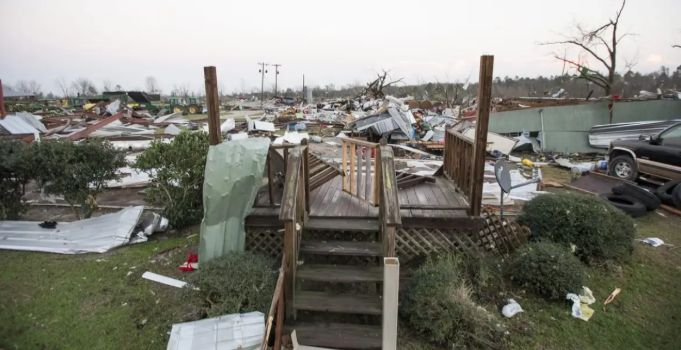
Indigenous Communities Seek Recognition and Support Amid Climate and Housing Crises
Theresa Dardar, a member of the Pointe-Au-Chien Indian Tribe, recalls a time when Louisiana’s coastal landscape was a network of recognisable waterways. Today, she barely recognises the area, as rising sea levels and stronger storms have turned once-protected marshlands into open waters.
“We’ve lost all our markers,” Dardar explains from her community centre in Pointe-Aux-Chenes. “It’s so open now. Without guidance, I wouldn’t know where to go.”
The impacts of the climate crisis, including land erosion, increased salinity, and extreme weather, have devastated Louisiana’s Indigenous Tribes, particularly after Hurricane Ida struck in August. Winds exceeding 200 mph levelled homes, leaving thousands of residents in Terrebonne and Lafourche parishes homeless. Dardar fears another storm of this magnitude could obliterate what remains of their community.
“We’ve always been neglected,” she says. “If FEMA doesn’t help, I don’t know what we’ll do. Most people don’t have the funds to rebuild.”
Despite state and federal promises, aid has been slow. Residents remain scattered across temporary shelters, while others continue living in storm-damaged homes or vehicles. Requests for 10,000 FEMA trailers have gone unanswered, and many feel abandoned in the face of worsening conditions.
Coastal Indigenous Tribes like Pointe-Au-Chien, with roots tracing back to Chitimacha and other groups, face layered crises of colonisation, environmental degradation, and lack of federal recognition. This status limits access to essential funding and disaster relief, exacerbating their vulnerability to climate disasters.
The Isle de Jean Charles, home to the Biloxi-Chitimacha-Choctaw Tribe, exemplifies the crisis. The island has lost 98% of its land due to rising waters and erosion. While a federal grant in 2016 enabled plans to relocate inland, Tribal leaders argue that state interference undermined their vision for sustainable resettlement.
Hurricane Ida left the Isle further battered. Tribal councilman Chris Brunet posted a defiant sign outside his home reading, “ISLE DE JEAN CHARLES IS NOT DEAD. CLIMATE CHANGE SUCKS.”
Experts warn that Louisiana’s coastline could vanish within decades. Tulane University’s Torbjörn Törnqvist reports that sea-level rise exceeding 6-9 millimetres annually will overwhelm remaining wetlands.
For Dardar and others, immediate action is critical. “The coast is the last thing on their minds,” she laments. “If we want to save anything, we have to protect it—and nothing’s being done.”











